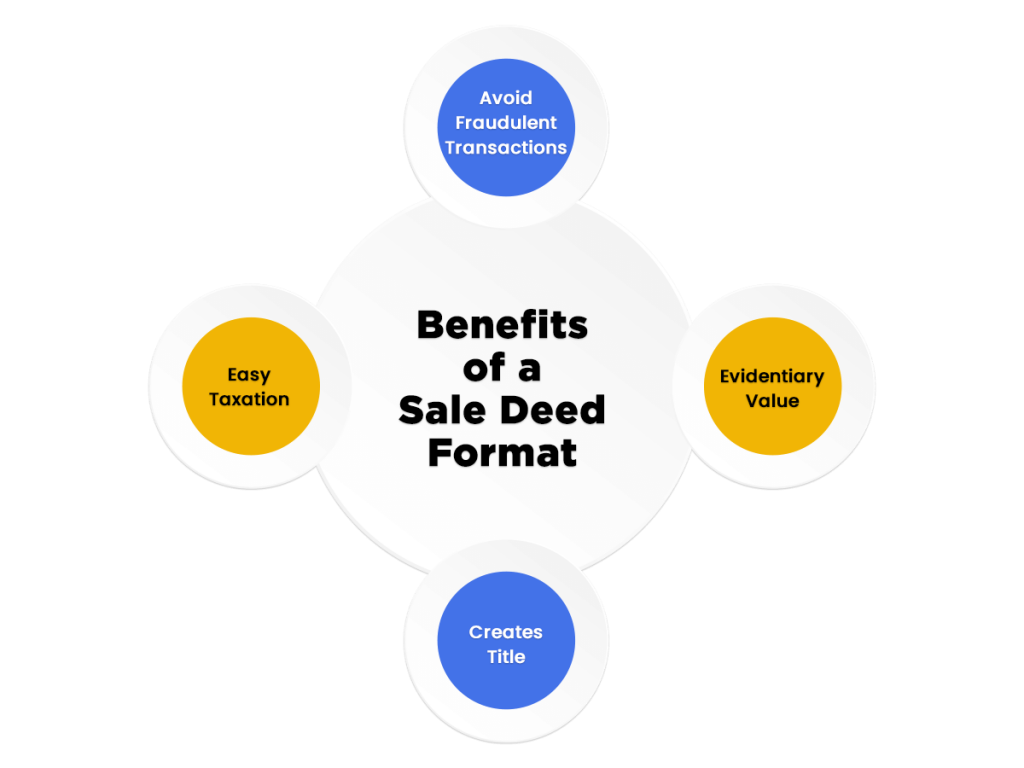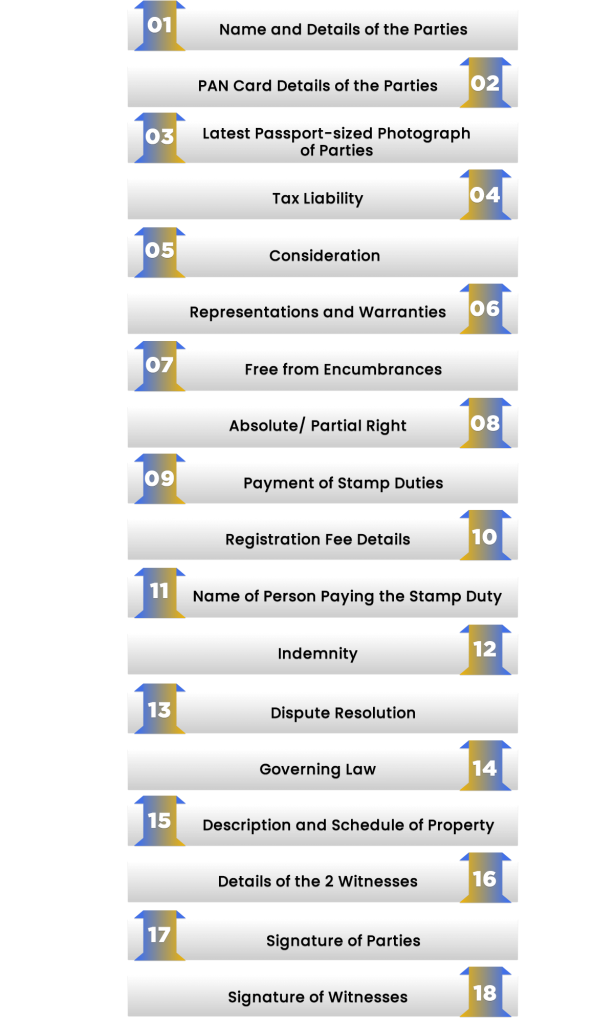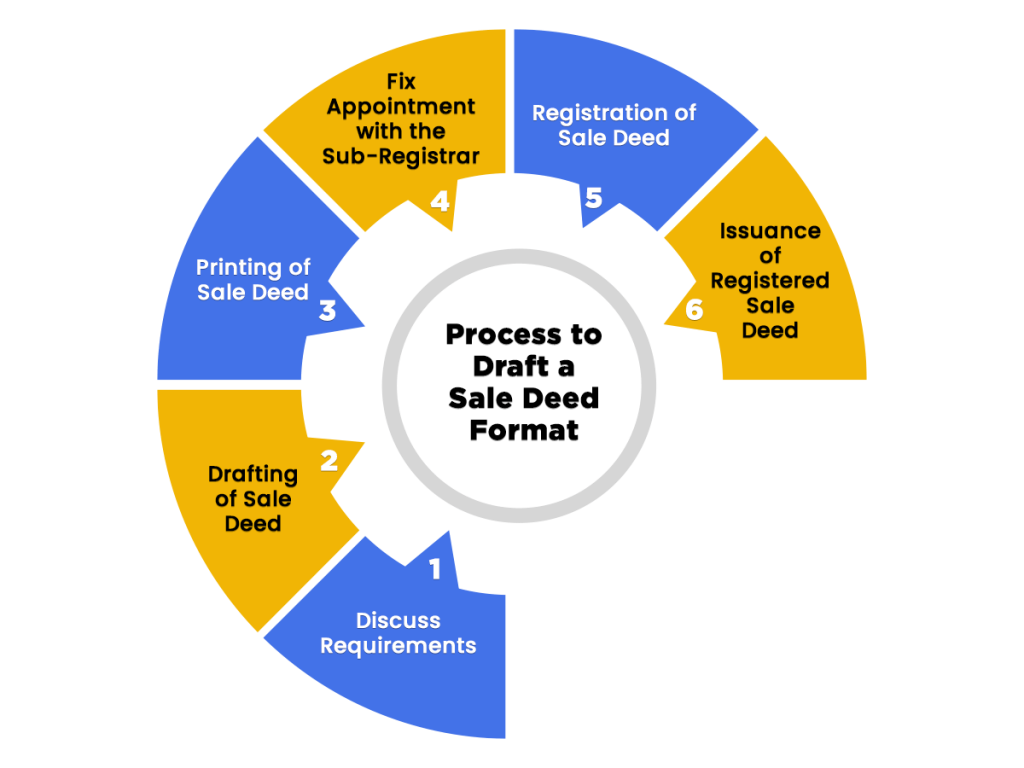Sale Deed Format: Process to Draft a Sale Deed in India

Shivani Jain | Updated: Sep 04, 2020 | Category: Agreements
The term “Sale Deed Format” denotes the performance of a legal document, which is required for validating the transaction of purchasing a property between seller and purchaser. It is regulated by the provisions of section 54 of the Transfer of Property Act 1882.
In this blog, we will discuss the concept of Sale Deed Format and the process to draft it.
Table of Contents
Concept of Sale
The term “Sale” denotes the transaction of Transfer of Ownership in exchange for a price, which is either paid or promised, or partly paid or partly promised.
Under this, a seller decides to sell his/her property to another person on an immediate basis. That means if a transfer is made for some future date, it will be known as Agreement for Sale.
Concept of Sale Deed Format
The term Sale Deed denotes a written document that acts as a Legal Proof of Transfer and will include every detail concerning the Transfer of Ownership. Further, it is enforced by the provisions of the Registration Act of India and is made on a Non-Judicial Stamp Paper of a Value specified by the government.
The parties to a sale deed are Seller or Transferor, and Buyer or Transferee. Moreover, both parties must get the deed registered within 4 months of execution and sign it to accept to comply with the terms and conditions.
Lastly, the other names for Sale Deed are Conveyance Deed and Final Deed.
Benefits of Sale Deed Format

The benefits of a Sale Deed Format are as follows:
Avoid Fraudulent Transactions
A Registered Sale Deed allows the regulatory authorities to keep an eye on the Fraudulent Transaction concerning Properties.
Evidentiary Value
A Registered Sale Deed has evidentiary value. That means either of the party can establish the validity and title of the document before the court of law.
Creates Title
A Registered Sale Deed establishes the title over the new owner of the property.
Easy Taxation
A Registered Sale Deed includes the details about the cost involved in transferring the property, which will directly make the process of calculating tax easier.
Key Components of Sale Deed Format

The key components of a Sale Deed Format are as follows:
- Name and Details of the Parties
- PAN Card Details of the Parties
- Latest Passport-sized Photograph of Parties
- Tax Liability
- Consideration
- Representations and Warranties
- Free from Encumbrances
- Absolute/ Partial Right
- Payment of Stamp Duties
- Registration Fee Details
- Name of Person Paying the Stamp Duty
- Indemnity
- Dispute Resolution
- Governing Law
- Description and Schedule of Property
- Details of the 2 Witnesses
- Signature of Parties
- Signature of Witnesses
Also, Read: Gift Deed Registration
Process to Draft and Register a Sale Deed Format

The steps involved in the process to draft and Register a Sale Deed Format are as follows:
Discuss Requirements
In the first step, the applicant needs to hire an experienced lawyer to discuss the requirements of a Sale Deed.
Drafting of Sale Deed
Now, based on the discussion, the lawyer will draft the sale deed in 3 to 4 Business Working Days. After drafting, the lawyer will send the draft to the applicant for Review and Approval.
Printing of Sale Deed
After the approval of the sale deed, in the next step, the lawyer will get the deed printed on a non-judicial stamp paper of the value specified by the government.
Fix Appointment with the Sub-Registrar
Now, fix an appointment with the Sub-registrar, within whose jurisdiction the property is located.
Registration of Sale Deed
Under this step, the applicant, together with his/her lawyer and 2 witnesses, will visit the office of the Sub-registrar to sign the document and pay the fees specified.
Issuance of Registered Sale Deed
In the last step, the Sub-Registrar will Issue a Registered Sale Deed to the applicant.
Who Pays for the Execution of a Sale Deed?
In the process of Execution of a Sale Deed, the buyer is liable to pay the Stamp Duty and Registration Fees. However, the seller needs to ensure that all the charges concerning the property are already paid before the Final Sale Deed Agreement.
Documents Required for Sale Deed Registration
The documents required for the registration of a Sale Deed are as follows:
- Draft of a Sale Deed.
- Records of RTC (Rights, Tenancy, and Corp) Extracts.
- Katha Certificate
- Mutation Register Extracts.
- Joint Development Agreement.
- General Power of Attorney.
- Building Plan approved by the Statutory Authority.
- NOC (No Objection Certificate) from Electricity Department / Water Works/ Pollution Control Board/ Air Port Authority.
- Supplementary agreement or Ratification Deed.
- Allotment Letter from the Housing Board/ Builder/ Co-Operative Society.
- In case of a loan, Original Property Documents submitted with the Bank.
- Sale agreement with the Seller.
- In case of resale of a property, copy of all the previous registered documents and NOC from the apartment association.
Difference between Sale Deed and Agreement to Sale
| S. No | Agreement of Sale | Sale Deed |
| 1. | The term “Agreement of Sale” denotes Future Transfer. | The term “Sale Deed” denotes that a property is transferred immediately. |
| 2. | In this case, the risk remains with the seller | In this case, the risk is transferred immediately |
| 3. | Agreement of Sale is an Executors Contracts | Sale Deed is an Executed Contract |
| 4. | In the case of Breach of Terms and Conditions prescribed in the Agreement of sale, the applicant can file a suit for damages | In the case of Breach of Terms and Conditions prescribed in the Sale Deed, the applicant can file a suit for both Damages and Cost |
| 5. | Agreement of Sale differs from one state to another state | In contrast, Sale Deed is a mandatorily registered instrument |
Mandatory Disclosures in a Sale Deed Format
As per section 55 of the Transfer of Property Act[1], both the seller and buyer need to make certain disclosures and representations concerning the immovable property in the Sale Deed. Further, as per section 55 (1), the disclosures and representations that a seller needs to make are as follows:
- Full Disclosure to the buyer about the following.
- Material Defect in the Property
- Defect in Seller’s Title
- Third-Party claims
- Disputes about which the Buyer is Unaware.
- Defects which the Buyer cannot Discover with Prudence or Ordinary Care.
- To produce all the documents required by the buyer regarding the seller’s title for examination.
- To answer all the questions raised by the buyer regarding the property.
- Execution of the proper Conveyance or Sale Deed after the Payment of Amount.
- To take utmost care of the property and documents till the date of delivery of the property.
- Must offer the possession of the property in the manner accepted by the buyer.
- To make payment and clearances of all the government charges and rent accrued regarding the property till the date of delivery of possession.
- Needs to ensure Nil Encumbrance or Lien over the Property.
Conclusion
At last, we can say that a Sale Deed Format is a document enforced after the execution of the Sale Agreement entered by the Seller and Buyer, together with the compliance of all terms and conditions prescribed.
Further, it is enforced by the provisions of the Registration Act of India and is made on a Non-Judicial Stamp Paper of a Value specified by the government.
Also, Read: Partnership Deed Format














